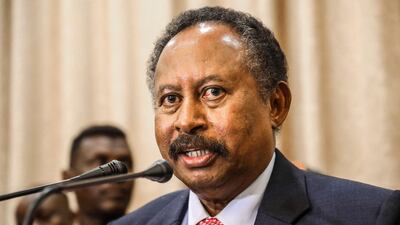Sudan’s prime minister on Thursday “accepted the resignation” of six cabinet ministers and fired the health minister in the biggest reshuffle since his government, the first after the 2019 removal of dictator Omar Al Bashir, took office 10 months ago.
A government statement said the ministers who resigned were those in charge of foreign affairs, finance, energy, agriculture, transport and animal wealth.
The changes were agreed during an emergency meeting of the government held earlier on Thursday, the statement said.
Speaking at the meeting, Prime Minister Abdalla Hamdok said there was a need to assess the government’s performance in response to mass demonstrations on June 30 that demanded faster and more comprehensive reforms from the transitional government.

Months of deadly street protests starting in December 2018 forced the military to remove Al Bashir in April last year. The generals and the leaders of the uprising reached a power-sharing agreement in August that gave Sudan a 39-month transition before free elections are held.
Al Bashir was sentenced to two years in prison in December for corruption and now faces other charges, including the overthrow of an elected government in 1989 and the killing of protesters during the latest uprising.
Earlier this week, Mr Hamdok fired Sudan’s police chief and his deputy, both of whom seen by pro-democracy groups as close to Al Bashir's regime.
Sudan has for years been mired in economic woes, but it might have won a breather when donors recently pledged nearly 1 billion dollars in aid. But the vast Afro-Arab country needs far-reaching reforms to get its economy on its feet.
Sudan also needs to negotiate a peaceful settlement to long-running conflicts in the west and south of the country, where rebels have taken up arms to end what they see as their marginalisation at the hands of an Arabized clique in Khartoum.
Months of negotiations between government and rebel representatives have yet to achieve a breakthrough. An end to those conflicts could significantly reduce the country's massive defence spending, freeing money for investing in health care and education.
_______________












